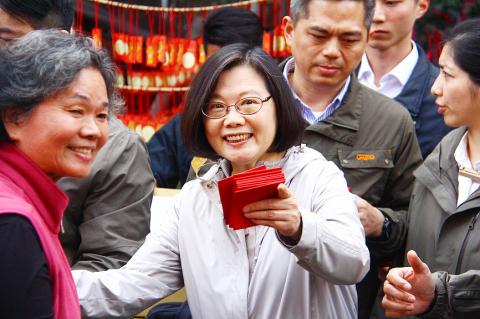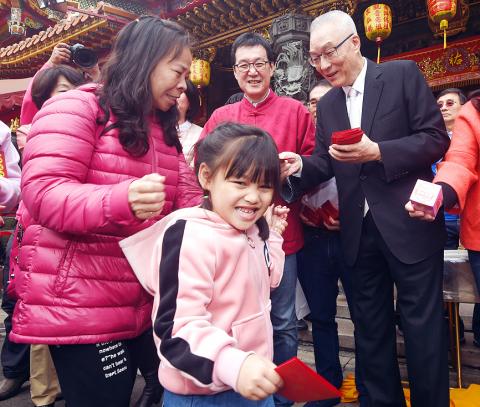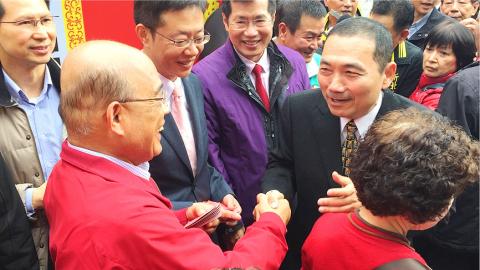Politicians yesterday visited temples around the nation on the first day of the Lunar New Year, praying for prosperity and well-being while handing out “lucky” red envelopes to temple-goers.
More than 1,000 people lined up in the morning at the Juesiou Temple (覺修宮) in Taipei to receive an envelope from President Tsai Ing-wen (蔡英文).
Temple officials said the line started to form three hours before Tsai’s scheduled arrival and grew to 300m long at one point, adding that at least 1,200 people joined the line.

Photo: Chiu Shu-yu, Taipei Times
Tsai was accompanied on her visit by Democratic Progressive Party (DPP) Chairman Cho Jung-tai (卓榮泰) and Minister of the Interior Hsu Kuo-yung (徐國勇), the first stop of her four-day-long temple visits to distribute red envelopes with NT$1 inside, which symbolizes a new beginning.
The Presidential Office said Tsai only visited temples in northern Taiwan yesterday, but she is to travel to central and southern Taiwan over the next three days.
Tsai also took to Facebook yesterday to wish the public a good new year, saying that a united Taiwan will surely be welcomed by good fortune ahead.

Photo: Liao Chen-huei, Taipei Times
“The nation’s fortune hinges on all of its people,” she said.
Premier Su Tseng-chang (蘇貞昌) yesterday continued his decades-long tradition of starting his new year by visiting temples in New Taipei City’s Banciao District (板橋), where he prayed for prosperity and peace for Taiwan.
Su exchanged friendly greetings with New Taipei City Mayor Hou You-yi (侯友宜) when they ran into each other at the Jieyun Temple (接雲寺).

Photo: Chiu Shu-yu, Taipei Times
Hou defeated Su in the mayoral election on Nov. 24 last year.
Former New Taipei City mayor Eric Chu (朱立倫), who has said he plans to run for president in next year’s election, visited the Jhulinshan Guanyin Temple (竹林山觀音寺) in Linkou District (林口), where he was dogged by questions about growing calls within the Chinese Nationalist Party (KMT) for a generational handover of power.
“Senior KMT members have made tremendous dedications to the party. Different generations should work together to make the KMT better,” Chu said.
Taichung Mayor Lu Shiow-yen (盧秀燕) prayed for the city at its Lecheng Temple (樂成宮), which she said has been a center of faith for her predecessors.
Minister of Transportation and Communications Lin Chia-lung (林佳龍), who lost his re-election bid to Lu in the November elections, visited the same temple, and said he hoped the city’s infrastructure development would be continued.
KMT Legislator Wang Jin-pyng (王金平), who is rumored to also be interested in running for president next year, visited a temple in Pingtung County’s Hengchun Township (恆春).
Wang said he would recruit Kaohsiung Mayor Han Kuo-yu (韓國瑜) if he decides to make a run for the presidency, but did not say for what role.
Additional reporting by CNA and staff reporters Chiu Shu-yi and Chang Ching-ya

The Taiwanese passport ranked 33rd in a global listing of passports by convenience this month, rising three places from last month’s ranking, but matching its position in January last year. The Henley Passport Index, an international ranking of passports by the number of designations its holder can travel to without a visa, showed that the Taiwan passport enables holders to travel to 139 countries and territories without a visa. Singapore’s passport was ranked the most powerful with visa-free access to 192 destinations out of 227, according to the index published on Tuesday by UK-based migration investment consultancy firm Henley and Partners. Japan’s and

NATIONAL SECURITY THREAT: An official said that Guan Guan’s comments had gone beyond the threshold of free speech, as she advocated for the destruction of the ROC China-born media influencer Guan Guan’s (關關) residency permit has been revoked for repeatedly posting pro-China content that threatens national security, the National Immigration Agency said yesterday. Guan Guan has said many controversial things in her videos posted to Douyin (抖音), including “the red flag will soon be painted all over Taiwan” and “Taiwan is an inseparable part of China,” while expressing hope for expedited “reunification.” The agency received multiple reports alleging that Guan Guan had advocated for armed reunification last year. After investigating, the agency last month issued a notice requiring her to appear and account for her actions. Guan Guan appeared as required,

Japan and the Philippines yesterday signed a defense pact that would allow the tax-free provision of ammunition, fuel, food and other necessities when their forces stage joint training to boost deterrence against China’s growing aggression in the region and to bolster their preparation for natural disasters. Japan has faced increasing political, trade and security tensions with China, which was angered by Japanese Prime Minister Sanae Takaichi’s remark that a Chinese attack on Taiwan would be a survival-threatening situation for Japan, triggering a military response. Japan and the Philippines have also had separate territorial conflicts with Beijing in the East and South China

A strong cold air mass is expected to arrive tonight, bringing a change in weather and a drop in temperature, the Central Weather Administration (CWA) said. The coldest time would be early on Thursday morning, with temperatures in some areas dipping as low as 8°C, it said. Daytime highs yesterday were 22°C to 24°C in northern and eastern Taiwan, and about 25°C to 28°C in the central and southern regions, it said. However, nighttime lows would dip to about 15°C to 16°C in central and northern Taiwan as well as the northeast, and 17°C to 19°C elsewhere, it said. Tropical Storm Nokaen, currently